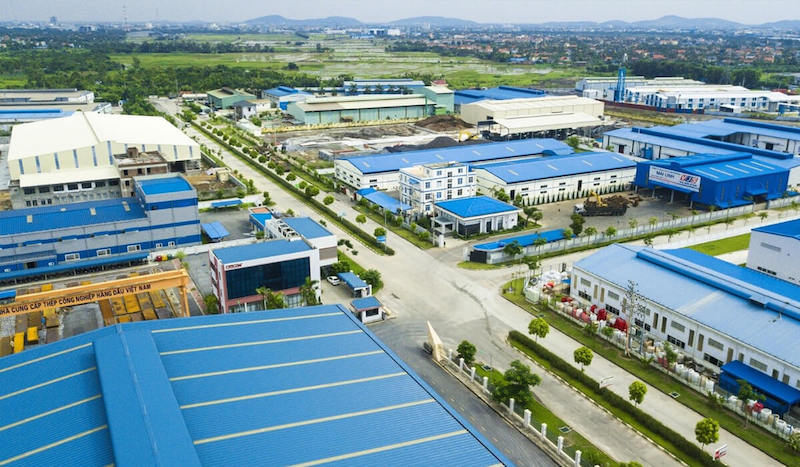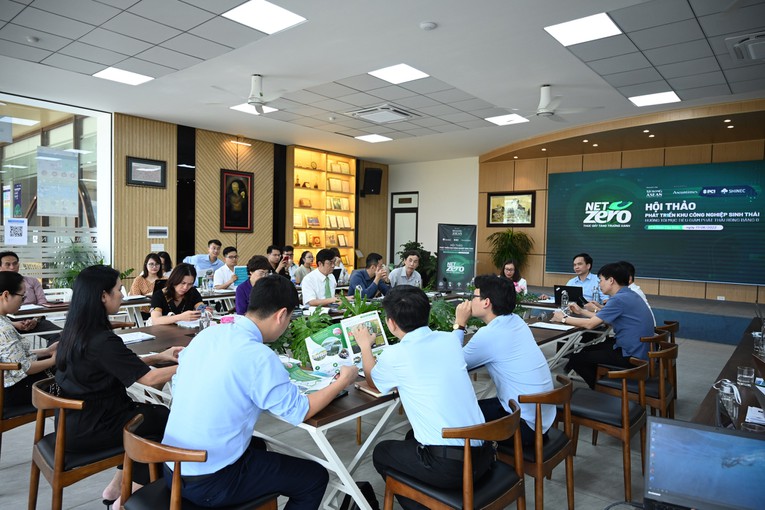Foreign businesses eye investment in eco-industrial parks
The construction of eco-industrial parks is considered a solution for Vietnam to reduce waste and promote sustainable growth
Foreign investors, who are seeking to invest in industrial parks in Vietnam, are very interested in infrastructure and environmental protection. In particular, import-export companies wanted to enter eco-industrial parks.
As an investor of Hai Phong-based Nam Cau Kien Ecological Industrial Park, Pham Hong Diep, Chairman of Shinec ISC, revealed the reason why operating in eco-industrial parks would help the manufacturers overcome non-tariff barriers when Vietnam joined international trade agreements.
| Nam Cau Kien Ecological Industrial Park in Haiphong City |
“In Nam Cau Kien, we have built three models of industrial symbiosis system. Factories of Japanese, South Korean, Dutch, Italian, Singaporean, and Vietnamese enterprises are all linked together towards increasing added value for the benefit of each other,” he added.
As Vietnam is gradually transforming its development model towards sustainability under the National Green Growth Strategy, the policy of developing eco-industrial parks and the circular economy development strategy have received much attention from domestic and foreign investors, according to local experts attending the conference “Developing eco-industrial pars towards the goal of reducing net emissions to zero” organized by Mekong ASEAN magazine on June 17 in Haiphong City.
The Southeast Asian country has nearly 400 industrial parks and economic zones, attracting a total foreign direct investment capital of about US$12 billion, accounting for about 80-90% of foreign-invested projects in the manufacturing sector.
However, Vuong Thi Minh Hieu, Deputy Director of the Department of Management of Economic Zones under the Ministry of Planning and Investment said that, besides the positive aspects, the rapid industrial development also caused certain impacts on the environment.
She added that a number of industrial parks are operating without complete wastewater treatment plants, threatening the health and lives of local people due to water pollution, air pollution, and hazardous waste.
“Therefore, it is necessary to transform from traditional industrial zones into more sustainable ones, with a focus on efficient use of resources and cleaner production,” she said.
“The construction of eco-industrial parks is considered a solution to overcome the limitations and inadequacies of environmental issues, reduce waste of resources, and promote sustainable growth.”
Legal corridor to support
According to Mai Van Sy, the Chairman of the Mien Duyen Hai Investment Design Consultancy Joint Stock Company, Vietnam's policy has not encouraged businesses to invest in building eco-industrial parks.
He said that if building an ecological model according to the criteria prescribed by the Ministry of Construction, 70-75% of the land would be dedicated to industrial production while the rate of land fund for green trees will be narrowed.
| Delegates attend the conference in Haiphong City. Photo: Mekong ASEAN |
“Developing an eco-industrial park requires the planning of trees. The will and responsibility of businesses are very important to do this,” he said. “It is necessary to have specific and clear mechanisms and policies to support the development of eco-industrial parks. For instance, if they receive land rental exemption like investing in an economic zone, more businesses would be willing to pour money in.”
Nguyen Tram Anh, the national project officer of the United Nations Industrial Development Organization (UNIDO), assessed that science and technology are very necessary for the process of transitioning from traditional industrial parks to ecological ones. This process has two parts: policy and implementation.
“Vietnam's eco-industrial park development policy is more advanced than that of some other countries. Indonesia is still learning from Decree 35 on the development of eco-industrial parks in Vietnam, we are even more developed in this field than the UK or Colombia. This is a positive aspect,” she added.
In addition to policy support, she said, the role of the industrial park management board is also very important in the transformation. However, the link between local businesses and the management board is weak.
“Transitioning from traditional industrial parks to eco-industrial parks requires support from many stakeholders, not the Decree. Economy 4.0 is creating a symbiotic connection inside an industrial park, especially an eco-industrial park," she concluded.













